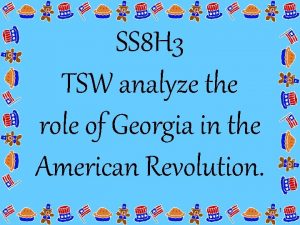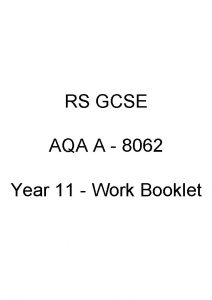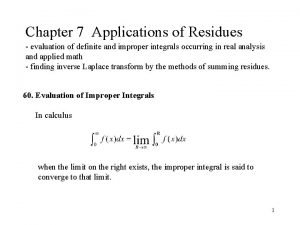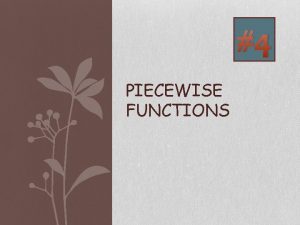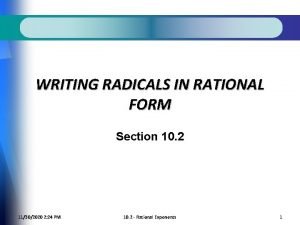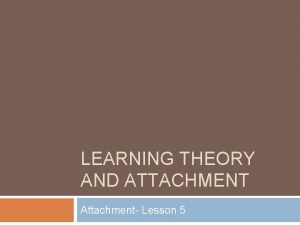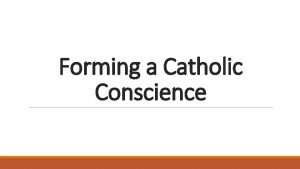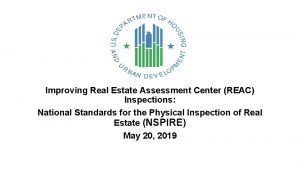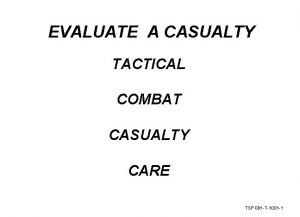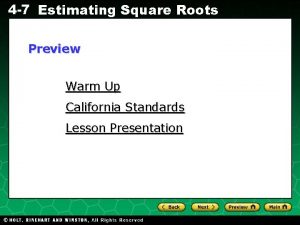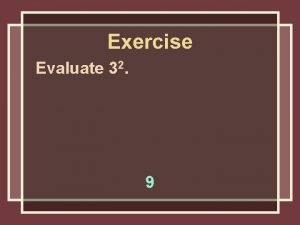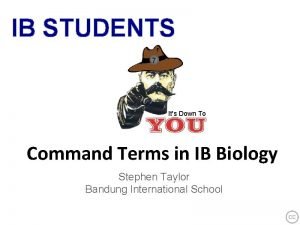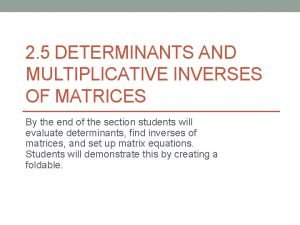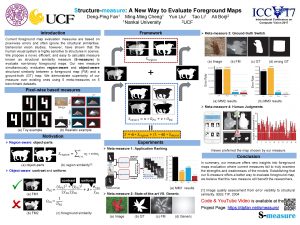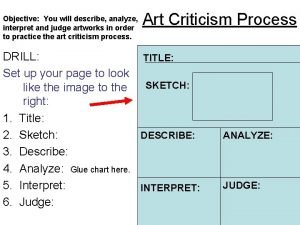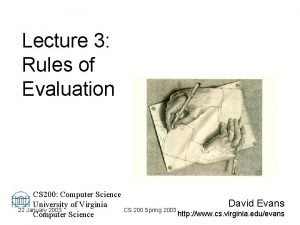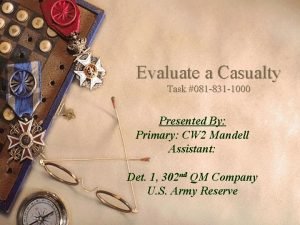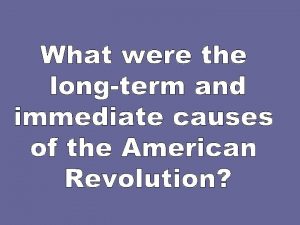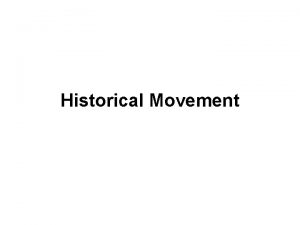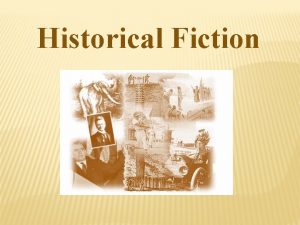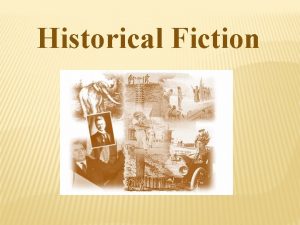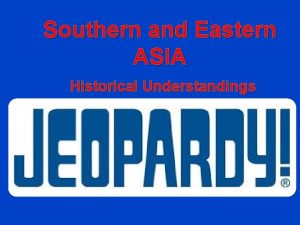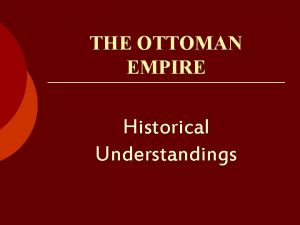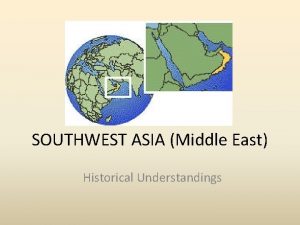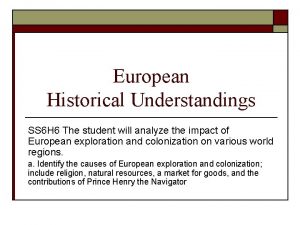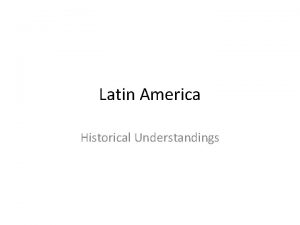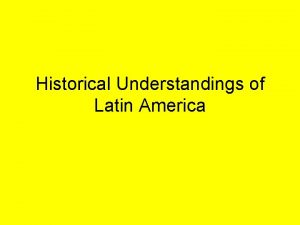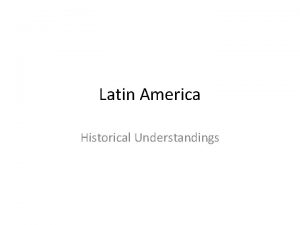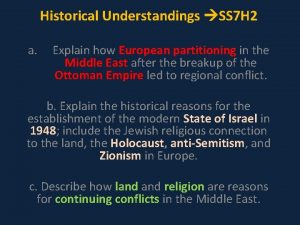Historical Understandings SS 8 H 1 TSW evaluate












![The Spanish named this region Guale [wallie] for the Indians living in this area. The Spanish named this region Guale [wallie] for the Indians living in this area.](https://slidetodoc.com/presentation_image_h2/9c5c75380ceec2201b66977a6ef7724e/image-13.jpg)


















































































- Slides: 95

Historical Understandings SS 8 H 1 TSW evaluate the development of native American cultures and the impact of European exploration and settlement on Native American cultures in Georgia. 1

b. Evaluate the impact of European contact on Native American cultures; include Spanish missions along the barrier islands, and the exploration of Hernando de Soto. 2

Hernando de Soto In 1539, the Spanish explorer de Soto left Havana, Cuba with a huge group of men and animals. They landed in present -day Florida. 3

They marched north and in 1540 they entered the southwestern part of Georgia, close to present-day Albany. They wanted one thing as they moved across the state: gold. 4

When de Soto arrived in Georgia, the native tribes saw white men and horses for the first time. De Soto had only a small number of men to face thousands of American Indians, but his weapons were better. The Spanish also wore plated armor, which arrows couldn't pierce. 5

During de Soto’s search for gold in Georgia, his soldiers killed thousands of American Indians. 6

Many more Indians died from diseases brought to the new World by the Spanish and other explorers. 7

Some historians believe almost half the Native American population died from measles, smallpox, influenza, and whooping cough. 8

De Soto's expedition into North America was a failure, however. He found no gold or treasure. Most of his army was lost to starvation or disease. 9

De Soto himself died somewhere along the Mississippi River. His march through Georgia changed the lives and culture of the American Indians forever. 10

Spanish Missions In 1565, Spain sent Captain General Pedro Menéndez to found a colony in St. Augustine, Florida. A colony is a group of people who settle a new land but keep ties to their homeland. 11

In 1566, the Spaniards moved up the coast to St. Catherines & Cumberland Islands. That year, the Spanish founded a mission, Santa Catalina, on St. Catherines ………………………. Island. 12
![The Spanish named this region Guale wallie for the Indians living in this area The Spanish named this region Guale [wallie] for the Indians living in this area.](https://slidetodoc.com/presentation_image_h2/9c5c75380ceec2201b66977a6ef7724e/image-13.jpg)
The Spanish named this region Guale [wallie] for the Indians living in this area. About 30 men were left to establish the first Spanish post on Georgia soil. 13

The Spanish later established other missions on St. Simons Island Sapelo Island at the mouth of the Altamaha River. 14

The main purpose of the missions was to convert the Indians to the Catholic faith. Building missions and having soldiers ……………………to guard …………………………them ……………………established ………………………. . Spanish ………………………. claim to ………………………the land. 15

Trade between the Indians and Spanish also took place at the missions. 16

For a time, the missions did well. There were tensions between the Spanish and the Indians as the missionaries tried to force the Indians to conform to their ideas of faith and village life. 17

There were occasional uprisings and some of the Indians moved away from the missions. The Indians population also decreased because of diseases brought by the Europeans. • Elizafield tabby ruins 18

Tensions further increased when the British settled in present-day Charleston, SC around 1670. The British establish trade routes with the local tribes and encouraged the disagreements between the missionaries and the Indians. 19

The British also probably encouraged pirates to raid the Spanish missions. All of these problems led the Spanish to gradually withdraw from the Georgia coast by 1685. 20

SS 8 H 1 c Explain reasons for European explorers and settlement of North America, with emphasis on the interests of the French, Spanish, and British in the southeastern area. 21

De Soto was followed by many other European explorers, most of them from Spain, France and England. 22

These nations established settlements in Georgia and competed with each other and with Native American tribes for control of the land. 23

For most of the 1500 s, Spain’s hold over the missions and its colonies made it an important player in the race for control over the New World. 24

As a result of the gold Spain took from the New World, the country became rich and powerful. Spain fought to hold on to its gains while the English and French tried to gain a share of the treasures. 25

By the end of the 1500 s, the conflict between Spain and England had turned into an undeclared war at sea. English sea captains captured Spanish treasure ships filled with gold, silver, and other valuable goods. 26

The British also attacked and burned Spanish settlements in the New World. 27

To counter these attacks, Spanish King, Phillip II, plotted to invade England using a huge fleet of ships that the Spanish called the “Invincible Armada. ” 28

The Spanish plot failed as the English destroyed or ran off much of the Armada in 1588. 29

England then gained control of the seas and was ready to pursue its interests in the New World. 30

Like most Europeans, the English thought there were large amounts of gold, silver, and exotic foods in the New World. They thought the country that claimed this new land would become even more powerful. 31

In the 1600 s, the English began permanent settlements along the coast of the New World. Their first permanent settlement was Jamestown, Virginia in 1607. 32

By the close of the 1600 s, England had established 12 colonies long the Atlantic coastline. 33

Although Spain moved out of Guale by 1686, more than one country claimed the land. France was establishing colonies along the Gulf Coast and in northern Alabama. 34

Both the French and the Spanish posed a threat to the British colonies. Settlers in South Carolina asked that a fort be built at the mouth of the Altamaha River to serve as a “warning point” for invaders. 35

In 1721, Fort King George was completed. The fort established the English presence in Georgia. 36

SS 8 H 2 The student will analyze the colonial period of Georgia’s history. a. Explain the importance of James Oglethorpe, the Charter of 1732, reasons for settlement, Tomochichi, Mary Musgrove, and the city of Savannah. 37

James Oglethorpe James Edward Oglethorpe, born in London in 1696, and was well-educated and wealthy. He cared greatly about people in trouble and tried to find way to help them. 38

In 1722, Oglethorpe became a member of the House of Commons. 39

During that time, Great Britain was faced with many problems. Many citizens could not pay their debts. Those who could not pay their debts went to jail. 40

Among those people that went to jail was Oglethorpe’s friend, architect Robert Castwell. Oglethorpe became angry because Castwell died of smallpox in debtors prison. 41

Oglethorpe believed that debtors should not be jailed. He worked to get laws passed to improve prison conditions and to set thousands of debtors free. 42

Unfortunately, just letting people out of prison didn’t help them. There were no jobs for them, and without work, they still couldn’t pay their debts. 43

Dr. Thomas Bray, a clergyman, proposed that a colony be founded to help those people. 44

Bray died, but Oglethorpe and 20 other men developed a plan that promised a fresh start in the New World for “unfortunate, but worthy individuals. ” 45

In the summer of 1730, Oglethorpe's group asked King George II for a tract of land “southwest of Carolina for settling poor persons of London. ” 46

The group knew Great Britain’s two main reasons for beginning new colonies were (1) a balanced trading policy to make Great Britain selfsufficient and (2) defensive buffers to protect British colonies from the French, Spanish, and Native Americans. 47

Oglethorpe’s group proposed ways for their new colony to carry out those goals of self-sufficiency and defensive buffers. 48

The new settlement could defend the southern Carolinas from Spanish Florida. It could also provide protection from the French who were pushing east from the Mississippi River valley. 49

Oglethorpe's group also listed economic reasons for the settlement. France and Spain made money trading with the Native Americans. 50

Great Britain could benefit from the trade in the area between the Mississippi River and the Atlantic Ocean. 51

The colony could produce silk, cotton dyes, and wine. Great Britain was importing these items from France, Russia, and Spain. 52

The colonies promised to send spices and semitropical fruit to Great Britain. British merchants were pleased with the idea of getting a good supply of raw materials while also having a new market for their goods. 53

Georgia, like other American colonies, would offer religious freedom to Protestants who were being mistreated by the Catholic church in Europe. 54

The king also liked the idea of more land greater power for Great Britain. 55

On June 7, 1732, King George II granted a charter to Oglethorpe’s group of trustees for establishing the colony of ……………………. Georgia ………………and managing ……………. . it for 21 years. 56

A charter is a legal document that grants special rights and privileges. Trustees are people who hold responsibility on behalf of others. 57

The Georgia charter granted an area of “all those lands, Countries, and Territories” between the Savannah and the Altamaha rivers extending westward “to the South Seas” (Pacific Ocean. ) 58

In the charter, the king stated that the trustees could not own land, hold political office, or be given money for their work. 59

Papists (Catholics), blacks, liquor dealers, and lawyers could not become colonists. Catholics were excluded because of a longstanding division between the Catholic Church and the Church of England. 60

Blacks were not admitted so as not to introduce slavery to the colony. The trustees feared settlers wouldn’t work if liquor was permitted. 61

They wanted colonists to settle their differences out of court and didn’t think lawyers would allow them to do this. 62

The colony belonged to the Crown (monarchy), so the trustees were to get instructions from King George II. They could pass no laws unless the king agreed. 63

The trustees worked around some of the rules by not having a governor and by using regulations, or government orders, instead of laws. 64

Reasons for Settlement A search began to find settlers for the newest colony. Newspapers told of a land with mild temperatures and rich soil and the promise of a new start in life. 65

Sir Robert Montgomery’s description of the colony as the “most delightful Country of the Universe” was widely accepted as fact. 66

Clergymen preached sermons, wrote religious books, and raised a great deal of money by talking about the goodness of the proposed colony. 67

The trustees talked with applicants and planned for the voyage and settlement. Unfortunately, debtors and former prisoners did not get to go. 68

This meant that the humanitarian reasons that Oglethorpe was interested in were all but forgotten. 69

The applicants chosen were promised 50 acres of land, tools, and enough food for one year. Potential colonists who could pay their own way received 500 acres of land permission to take 10 indentured servants. 70

In exchange, colonists had to agree that 1) Each man was to defend the new colony against all enemies. 2) Land given to colonists couldn’t be sold, and no money could be borrowed on it. 71

Land however could be passed on to a male heir. 3) Each colonist was to receive seeds and agricultural tools to use in cultivating the lands of the new settlement. 72

4) Colonists were to use a portion of their land to grow mulberry tree so that silkworms would eat the leaves, make cocoons, and produce silk. 73

5) Each colonist was to obey all regulations established by the trustees. 74

When the chosen settlers gathered on the London docks, they were both excited and a little afraid of the adventure ahead. 75

Historians don’t agree on the exact number of men, women, and children who traveled from Gravesend, England to Georgia, but between 114 and 125 people left London on November 17, 1732. Their voyage took 88 days. 76

Besides its passengers and crew, the Ann carried sheep, hogs, ducks, geese, and several dogs. There isn’t a record of the ship being uncomfortable, but it was probably crowded with all the people an their belongings. 77

Only two deaths were reported among the colonists on the trip, both of them infants. Finally, land was sighted, and the Ann docked at Charleston, SC. The ship stayed there one day, then was put in at Port Royal (Beaufort), SC on January 14, 1733. 78

Tomochichi and Mary Musgrove Before the Ann could set anchor, Oglethorpe had to make friends with the Yamacraw Indians through their chief, Tomochichi. 79

Oglethorpe went to the trading post in the Yamacraw village to find an interpreter. The trading post was operated by John and Mary Musgrove. 80

John agreed, but Mary who was part Indian and part British, soon took over. With her help, Oglethorpe and Tomochichi established a close friendship that lasted until the chief’s death in 1739. 81

The passengers waited on board while Oglethorpe and his staff searched for a permanent settlement site. The place decided on was about 18 miles from the mouth of the Savannah River. 82

On February 12, 1733, Chief Tomochichi allowed the Ann’s passengers to land on sandy Yamacraw Bluff overlooking the Savannah River. 83

The settlement they established was the 13 th British colony in the New World. Georgia’s citizens were added to over 650, 000 other colonists spread from Massachusetts through the Carolinas. 84

The City of Savannah When the colonists landed at Yamacraw Bluff, they put up four large tents for shelter. Then they began getting the land ready for planting and preparing timber to build permanent homes. 85

Within two weeks, they began building the first permanent homes. Preserved in its original state, the now famous Pirate House Restaurant is said to be where Blue. Faced Pirate Flint of Treasure Island died. The quaint building is situated in the original Trustees Garden (1773) from which came the first upland cotton and the Georgia Peach. Adjoining Herb Shop is thought to be the oldest home in Savannah (1734). 86

Oglethorpe had no title and only limited power, but he was accepted as the leader of the colony. During the early months, he got grants of land made treaties with the Native Americans. 87

He had a small fort built on the bank of the river and trained a militia or citizen army, to defend the settlement. 88

Oglethorpe also worked with Colonel William Bull and surveyor Noble Jones to design the future city of Savannah. The basic pattern of their first planned city in the colonies was after a design by Robert Castell, Oglethorpe’s friend who had died in an English debtors prison. 89

The plan was for Savannah to have four squares. On the north and south sides of each square were 20 lots. On the east and west sides, four larger lots were set aside for such buildings as churches or stores. 90

The center of each square was for social, political, and religious gatherings. The squares were divided into blocks called tythings and wards. 91

There were ten houses in each block and 4 blocks in each ward. 92

Each settler was expected to care for his house in Savannah, his 5 -acre garden plot on the edge of town, and his 45 farm acres in the country. 93

During the first months, the colonists cultivated mulberry trees to feed silkworms. They also built a sundial for telling time, a gristmill for grinding corn into meal, a courthouse, a water well, and a bakery. 94

Work was done in spite of growing medical problems likely caused by a lack of fresh vegetables, changes in the climate, poor sanitation, and hard physical labor. 40 settlers died in the first year. 95
 Tsw death and axes
Tsw death and axes Tsw cycles
Tsw cycles Tsw crime and punishment
Tsw crime and punishment Layers of the soil
Layers of the soil How to evaluate historical sources
How to evaluate historical sources Year 11
Year 11 Enduring understandings examples
Enduring understandings examples Enduring understanding
Enduring understanding 認知領域
認知領域 Evaluate square root
Evaluate square root Deakin evaluate
Deakin evaluate Ways to evaluate limits
Ways to evaluate limits Unit circle explained
Unit circle explained Self sealability test for closures
Self sealability test for closures Evaluate the integral by making the given substitution
Evaluate the integral by making the given substitution Application of residue theorem to evaluate real integrals
Application of residue theorem to evaluate real integrals Piecewise function examples with answers
Piecewise function examples with answers Evaluate radicals calculator
Evaluate radicals calculator For the domain of a function you use ____ notation
For the domain of a function you use ____ notation Evaluate example
Evaluate example Evaluation of postfix expression for 598+46*+7-*
Evaluation of postfix expression for 598+46*+7-* How to write in log form
How to write in log form Evaluate: log1664
Evaluate: log1664 Zero negative exponents
Zero negative exponents Outline bowlby's theory of attachment 6 marks
Outline bowlby's theory of attachment 6 marks Productdesigners do not conceptualize and evaluate ideas
Productdesigners do not conceptualize and evaluate ideas Evaluate 27^(2/3)
Evaluate 27^(2/3) Learning theory attachment
Learning theory attachment Exercise #1 – evaluate case studies answer key
Exercise #1 – evaluate case studies answer key Evaluating polynomial function
Evaluating polynomial function See judge act evaluate
See judge act evaluate Real estate assessment center
Real estate assessment center Evaluate a casualty
Evaluate a casualty Simplify expressions examples
Simplify expressions examples Evaluate the limit
Evaluate the limit How do you evaluate broadcast media
How do you evaluate broadcast media Simplify the absolute value expression
Simplify the absolute value expression Simplify square root of 82
Simplify square root of 82 Schema strengths and weaknesses
Schema strengths and weaknesses Evaluate 32 3/5
Evaluate 32 3/5 Cognitive model psychology
Cognitive model psychology Verbal expression
Verbal expression Arithmetic expressions containing a null value evaluate to
Arithmetic expressions containing a null value evaluate to Social and learning theory
Social and learning theory Evaluate the following postfix expression
Evaluate the following postfix expression Evaluate trig function using period as aid
Evaluate trig function using period as aid Evaluate the following postfix expression
Evaluate the following postfix expression Evaluate
Evaluate Evaluate the discriminant calculator
Evaluate the discriminant calculator Application of residue theorem to evaluate real integrals
Application of residue theorem to evaluate real integrals Evaluate 144/121
Evaluate 144/121 Evaluate 32 8
Evaluate 32 8 Strengths and weaknesses of schema theory
Strengths and weaknesses of schema theory Evaluate integers
Evaluate integers Understand apply analyze evaluate create
Understand apply analyze evaluate create Engage explore explain elaborate evaluate
Engage explore explain elaborate evaluate Evaluate trigonometric expressions
Evaluate trigonometric expressions What is an opvl
What is an opvl Unit 4 criminology
Unit 4 criminology Recursive formula example
Recursive formula example Formula for permutation and combination
Formula for permutation and combination Outline and compare two explanations for offending 16 marks
Outline and compare two explanations for offending 16 marks Outline ib command term
Outline ib command term How to evaluate the determinant of a matrix
How to evaluate the determinant of a matrix Evaluate 12p3
Evaluate 12p3 Potential synoynm
Potential synoynm Dividing polynomials algebra 1
Dividing polynomials algebra 1 Evaluate the expression
Evaluate the expression Sketch and calc
Sketch and calc Higher physical education
Higher physical education Indices examples
Indices examples Evaluate the feminist view of the family
Evaluate the feminist view of the family Evaluate expression
Evaluate expression Postfix to infix algorithm
Postfix to infix algorithm 622x8
622x8 Structure-measure: a new way to evaluate foreground maps
Structure-measure: a new way to evaluate foreground maps Evaluate the postfix expression 6523+8*+3+*
Evaluate the postfix expression 6523+8*+3+* Arithmetic expressions containing a null value evaluate to
Arithmetic expressions containing a null value evaluate to Algebra 2 unit 6 radical functions quiz 6-1 answers
Algebra 2 unit 6 radical functions quiz 6-1 answers Evaluate and graph polynomial functions
Evaluate and graph polynomial functions The event table contains these columns
The event table contains these columns Assure model lesson plan physical education
Assure model lesson plan physical education Persistence of memory analysis
Persistence of memory analysis Evaluate log
Evaluate log How to evaluate function
How to evaluate function Synthetic substitution
Synthetic substitution Evaluate in math
Evaluate in math Apa yang dimaksud dengan evaluasi sumber informasi
Apa yang dimaksud dengan evaluasi sumber informasi Evaluate 3/7
Evaluate 3/7 Site:slidetodoc.com
Site:slidetodoc.com Csc a
Csc a Rule of linear function
Rule of linear function Evaluate cos(60)
Evaluate cos(60) Evaluate
Evaluate Clive wearing tutor2u
Clive wearing tutor2u 8 steps to evaluate a casualty army
8 steps to evaluate a casualty army


